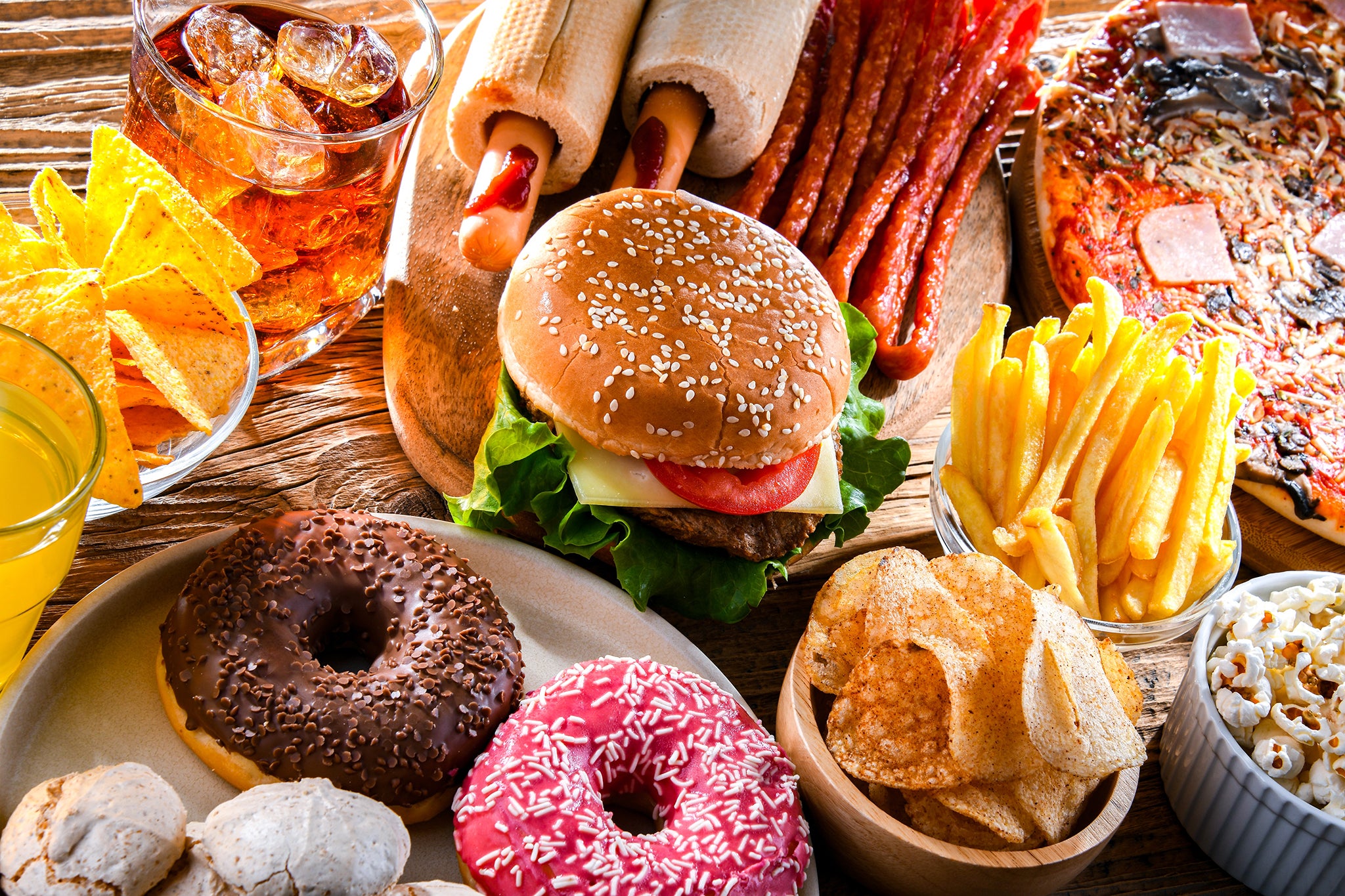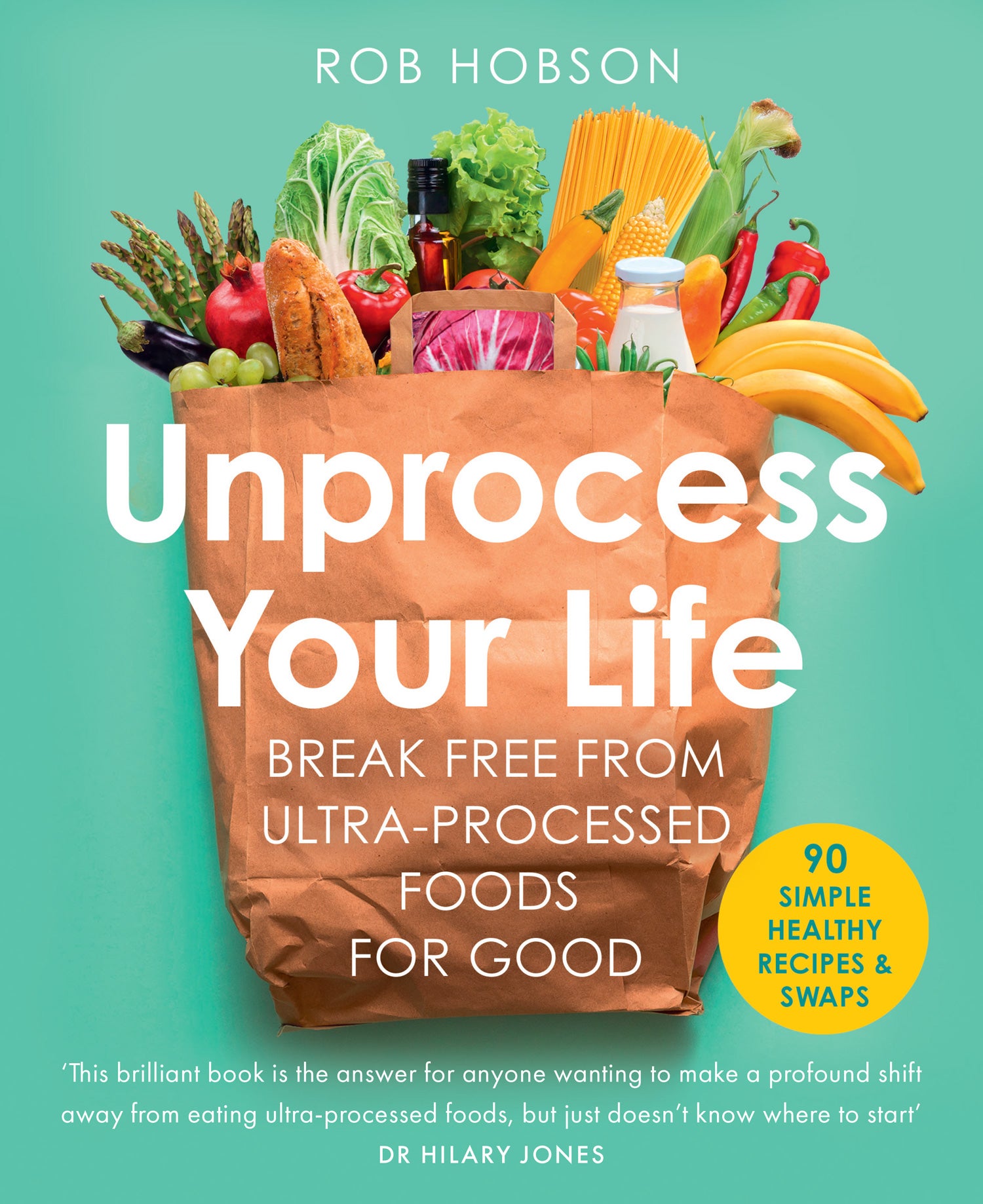How to unprocess your diet and protect your gut
New findings show that ultra-processed foods have a detrimental effect on almost every part of our bodies. Here, health food writer Rob Hobson explains why the link between our diet and gut could explain the new research, but the good news is there are simple things you can do to protect yourself...

It made grim reading, especially for anyone consuming it over a bowl of Coco Pops this morning. The findings were stark – the world’s most extensive review has established a direct connection between consuming ultra-processed foods (UPF) and 32 detrimental health effects.
In fact, these foods were found to be harmful to every part of our body, bringing with them elevated risks of heart disease, cancer, type 2 diabetes, adverse mental health outcomes, and premature death.
This ground-breaking umbrella review published in The BMJ involved nearly 10 million participants and highlights a growing global trend of UPF consumption, including breakfast cereals, protein bars, soft drinks, ready-made meals, and takeaways. Packed with fat, salt and sugar while lacking in vitamins and fibre, these foods now shockingly make up more than half of the average diet in the UK, with certain groups, particularly younger people and those residing in underprivileged areas, consuming diets containing up to 80 per cent of UPF’s.
But navigating a food shop and planning healthy meals to avoid harmful processed foods is easier said than done. While researching my book, Unprocess Your Life, it became clear to me that not all UPF foods are created equally, and some research has even suggested a positive effect on health by consuming nutrient-dense UPF foods such as wholemeal bread, cereals, and plant-based alternatives.
So where do we go from here? While on one side of the argument, people are demanding that UPFs should be banned or come with warnings like cigarettes, on the other side there is the ongoing debate over the classification of UPF to take in dietary benefits of eating nutrient-dense UPFs. However, while researchers are still trying to work out what specific ingredients are causing what problems, there is an overall consensus that processed foods are disrupting the delicate balance of the microbiome in our gut. And a growing body of evidence is pointing to this being at the root of why UPFs are so dangerous and damaging.

Dubbed our second brain, the effects of gut health (and unhealth) are now just being understood. This thriving area of nutrition research is starting to reveal how fundamental our gut is to our wellbeing – concerning mental health, weight maintenance, immunity, hormone regulation, digestion and energy metabolism. A higher intake of UPF is associated with approximately a 50 per cent increased risk of death related to cardiovascular diseases, a 48 to 58 per cent higher risk of anxiety and common mental disorders, and a 12 per cent increased risk of type 2 diabetes – and I believe this can be tracked back to how well (or badly) our gut is functioning.
The gut obesity connection
Ultra-processed foods are characterised by their extensive industrial processing and often contain artificial colours, emulsifiers, flavours, and other additives. A lot of research into this area has involved obesity as it is a risk factor for nearly all the non-communicable diseases outlined in the new study. Parallel studies have also shown that the intestinal microbiome is intrinsically linked with obesity risk and that obesity-related metabolic disorders are characterised by specific alterations in the composition and function of the human gut microbiome.
Research shows that the gastrointestinal microbiota can influence both how much energy we get from a diet and how we break down complex carbohydrates and fibres into short-chain fatty acids which are then absorbed to be used as an energy source in the body. The gut microbiome can also influence the regulation of appetite and satiety by producing specific metabolites that act on the brain.
There are several reasons why consuming large quantities of UPFs may impact the health of your gut microbiome. These include the lack of beneficial nutrients in the diet, overconsumption of unhealthy dietary components and excess intake of additives such as emulsifiers and artificial sweeteners. All of these affect our gut, which can in turn affect how effectively we digest and store food.
Swap foods in and out to diversify bacteria in the gut
UPFs are often low in fibre and rich in fats and sugars which negatively affect the diversity of the gut microbiome. To maintain a good diversity of bacteria in the gut, you should increase your fibre intake. Nutrient-dense UPFs may be a way of achieving this, given many people don't eat other fibre-rich foods such as legumes and whole grains. At the same time, UPFs high in sugar and unhealthy fats – such as ready-made meals, which are often sold as “healthy options” in supermarkets – should be swapped out for naturally sweet whole foods such as fruits, oily fish, nuts and seeds.
The high sugar and fat content in UPFs can also promote the growth of harmful bacteria that thrive on these nutrients. This can lead to an imbalance in the gut microbiota, known as dysbiosis, which can contribute to gut inflammation and increased intestinal barrier permeability, potentially leading to systemic inflammation and increased risk of chronic diseases.
Aside from making dietary changes that improve fibre intake, including probiotics that help feed the good bacteria in your gut, you can also explore foods rich in healthy bacteria, such as plain Greek yoghurt, kefir and fermented vegetables.
Know what makes a good prebiotic diet
Fibre acts as a prebiotic, feeding beneficial gut bacteria that produce short-chain fatty acids (SCFAs) like butyrate, propionate, and acetate. These SCFAs have anti-inflammatory properties, which are essential in maintaining gut barrier integrity and regulating the immune system. The typically low fibre content of UPFs, particularly those that act as prebiotics in the gut, can decrease these beneficial bacteria and their metabolites, potentially compromising gut health and immune function.
You can support your gut bacteria by consuming plenty of prebiotic foods, including garlic, onions, bananas, leeks, asparagus, barley, and oats, as well as cooked then cooled potatoes, rice and pasta that form prebiotic-resistant starches.
Recognise food label ‘red flags’
Some additives commonly found in UPFs, such as emulsifiers, artificial sweeteners, and preservatives, can directly impact the gut microbiota. For example, certain emulsifiers have been shown to alter the composition of the gut microbiota and increase the risk of gut inflammation and metabolic syndrome in animal studies. While these studies do not prove cause and effect in humans, there is a growing body of evidence suggesting that ultra-processed foods negatively affect the microbiome and health.
Research has highlighted significant concerns regarding the impact of emulsifiers found in ultra-processed foods (UPFs) on the gut microbiome, potentially contributing to various gut health issues, including inflammatory bowel disease (IBD), increased intestinal permeability, and inflammation.
Emulsifiers, commonly added to UPFs for texture and stability have been shown in both cell and animal studies to disrupt the mucus architecture of the gut, enhance intestinal permeability, and activate inflammatory pathways. This disruption can promote pro-inflammatory intestinal microbiota which can be a cause of inflammatory bowel disease. However, findings from the new study suggest that evidence to support the link between UPFs and conditions that fall under this term is limited.
Artificial sweeteners may also have an impact and could be one of the factors linking ultra-processed foods to a higher risk of obesity and type 2 diabetes. Sweeteners such as aspartame have been shown to impact insulin resistance, affecting how sugar is absorbed into the bloodstream. Other studies looking into the effects of aspartame and sucralose have shown specific changes in the gut bacteria associated with consuming them. This could lead to alterations in metabolic pathways which have been linked to glucose tolerance and dysbiosis.
The question on everyone's lips regarding UPFs is what additive causes what harm, but the research is not there yet to be conclusive. Studies focusing on emulsifiers and artificial sweeteners are probably the closest link there is so far. This may be a reason to omit these foods from the diet, but any omission of foods should be done sensibly to avoid limiting your intake of other nutrients which could then lead to an unhealthy relationship with food.
Avoid ‘leaky gut’ syndrome
The changes in the gut microbiome associated with UPF consumption, such as increased inflammation and reduced production of SCFAs, can lead to a weakened gut barrier. This matters because an increased permeability can allow bacterial endotoxins to enter the bloodstream which contributes to inflammation and associated health threats that come with that such as an increased risk of inflammatory bowel disease, cardiovascular disease and autoimmune diseases.
The fact that many UPFS have a low nutrient density is a potential driver for poor gut health, but while further research is needed to identify the degree to which additives such as emulsifiers and artificial sweeteners damage the gut microbiota – we do know an increase in high fibre foods such as wholegrains, legumes, fruits and vegetables can help strengthen the gut barrier.
Despite what you choose to believe about the true impact of UPFs on our health and the confusion over the current classification of these foods, it goes without saying that focusing on a diet of mostly whole foods in their most natural state is going to benefit your health.
At the same time, a realistic approach to eating is the likeliest way to achieve long-term consistency and if this means include some UPFs in your diet but balance them out with healthy eating options then so be it. This way people will be able to eat well within the time and budget restraints many have to live with. Knowing there are some easy wins to good gut health is the first step we can all make towards achieving a truly healthy diet.
‘Unprocess Your Life: The new cookbook to help you break free from ultra-processed foods’ is out now






Join our commenting forum
Join thought-provoking conversations, follow other Independent readers and see their replies
Comments